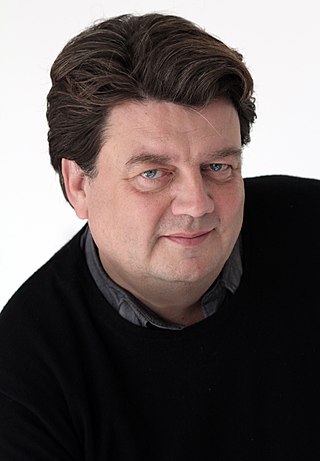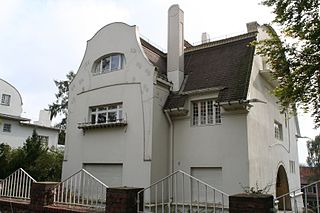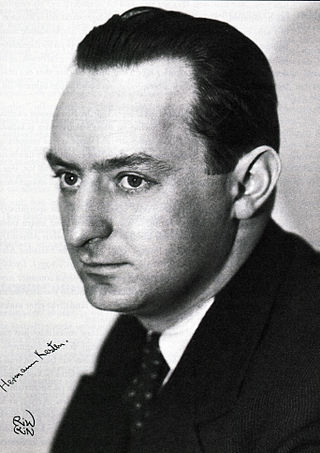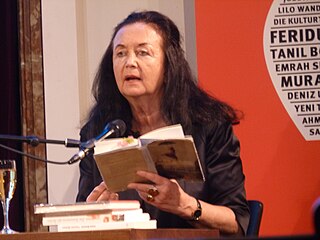
German literature comprises those literary texts written in the German language. This includes literature written in Germany, Austria, the German parts of Switzerland and Belgium, Liechtenstein, Luxembourg, South Tyrol in Italy and to a lesser extent works of the German diaspora. German literature of the modern period is mostly in Standard German, but there are some currents of literature influenced to a greater or lesser degree by dialects.
The Goethe Prize of the City of Frankfurt is an award for achievement "worthy of honour in memory of Johann Wolfgang von Goethe" made by the city of Frankfurt am Main, Germany. It was usually an annual award until 1955, and thereafter has been triennial. Following a decision of municipal authorities in 1952, the "Award of the Goethe Prize" only takes place every three years. Many recipients are authors, but persons working in several other creative and scientific fields have been honoured. The prize money is €50,000.
The Kleist Prize is an annual German literature prize. The prize was first awarded in 1912, on the occasion of the hundredth anniversary of the death of Heinrich von Kleist. The Kleist Prize was the most important literary award of the Weimar Republic, but was discontinued in 1933.

The Georg Büchner Prize is the most important literary prize for German language literature. The award is named after dramatist and writer Georg Büchner, author of Woyzeck and Leonce and Lena. The Georg Büchner Prize is awarded annually for authors "writing in the German language who have notably emerged through their oeuvre as essential contributors to the shaping of contemporary German cultural life".
The Toucan Prize is a literary prize given by the city of Munich to the best new publication by a Munich author. It has been awarded since 1965 and is endowed with 6,000 Euros.

Aribert Reimann was a German composer, pianist, and accompanist, known especially for his literary operas. His version of Shakespeare's King Lear, the opera Lear, was written at the suggestion of Dietrich Fischer-Dieskau, who performed the title role. His opera Medea after Grillparzer's play premiered in 2010 at the Vienna State Opera. He was a professor of contemporary Lied in Hamburg and Berlin. In 2011, he was awarded the Ernst von Siemens Music Prize for his life's work.
The Heinrich Mann Prize is an essay prize that has been awarded since 1953, first by the East German Academy of Arts, then by the Academy of Arts, Berlin. The prize, which comes with a €10,000 purse, is given annually on 27 March, Heinrich Mann's day of birth. The laureate is selected by an independent three-member jury which usually includes the previous year's laureate.
Heinrich Heine Prize refers to three different awards named in honour of the 19th-century German poet Christian Johann Heinrich Heine:

Wolfgang Kaleck is a German civil rights attorney. He is the founder as well as the general secretary for the European Center for Constitutional and Human Rights. He resides in Berlin, Germany.
The Erich Fried Prize is a literary prize in honour of the Austrian poet Erich Fried, and is awarded annually by the International Erich Fried Society for Literature and Language, based in Vienna. The value of the prize, endowed by the office of the Chancellor of Austria, is 15,600 euros. Each year the trustees of the Erich Fried Society select a juror, who nominates the winner of the prize for that year.

Friederike Mayröcker was an Austrian writer of poetry and prose, radio plays, children's books and dramatic texts. She experimented with language, and was regarded as an avantgarde poet, and as one of the leading authors in German. Her work, inspired by art, music, literature and everyday life, appeared as "novel and also dense text formations, often described as 'magical'." According to The New York Times, her work was "formally inventive, much of it exploiting the imaginative potential of language to capture the minutiae of daily life, the natural world, love and grief".

The Deutsche Akademie für Sprache und Dichtung was founded on 28 August 1949, on the 200th birthday of Johann Wolfgang von Goethe, in the Paulskirche in Frankfurt. It is seated in Darmstadt, since 1971 in the Glückert House at the Darmstadt Artists' Colony. It is a society of writers and scholars on matters pertaining to German language and literature in the Deutsche sprachraum, or Germanosphere.

Hermann Kesten was a German novelist and dramatist. He was one of the principal literary figures of the New Objectivity movement in 1920s Germany.

Ilavenil Meena Kandasamy is an Indian poet, fiction writer, translator and activist from Chennai, Tamil Nadu, India.
Hermann-Lenz-Preis was a literary prize of Germany from 1999 to 2009. The award for German-language poetry is named after the writer Hermann Lenz, who died 1998. The prize money was €15.000 donated by publisher Hubert Burda. Successor is the Petrarca-Preis for European writers. In 2008, the jury consisted of Michael Krüger, Peter Hamm, Peter Handke and Alfred Kolleritsch.

The Sigmund Freud Prize or Sigmund Freud Prize for Academic Prose is a German literary award named after Sigmund Freud and awarded by the Deutsche Akademie für Sprache und Dichtung. It was first awarded in 1964.
The Theodor Wolff Prize is a German journalism prize. It has been awarded annually since 1962 in five categories, equal prizes of €6,000, by the Federal Association of German Newspaper Publishers. In addition, at irregular intervals, journalists are awarded the Theodor Wolff Prize for their life's work.
The Fontane Prize of the City of Neuruppin was donated in 1994 on the occasion of the 175th birthday of Theodor Fontane from his native city of Neuruppin. Since 2019: Fontane-Literaturpreis der Fontanestadt Neuruppin und des Landes Brandenburg.

Irena Brežná is a Slovak-Swiss writer, journalist and human rights activist writing in German.









